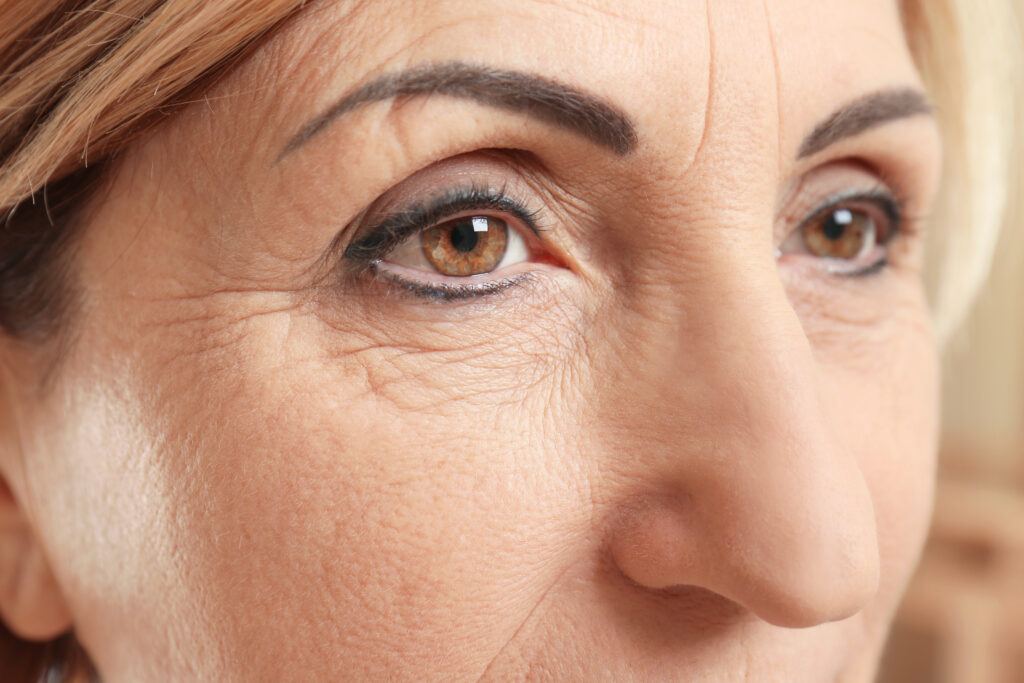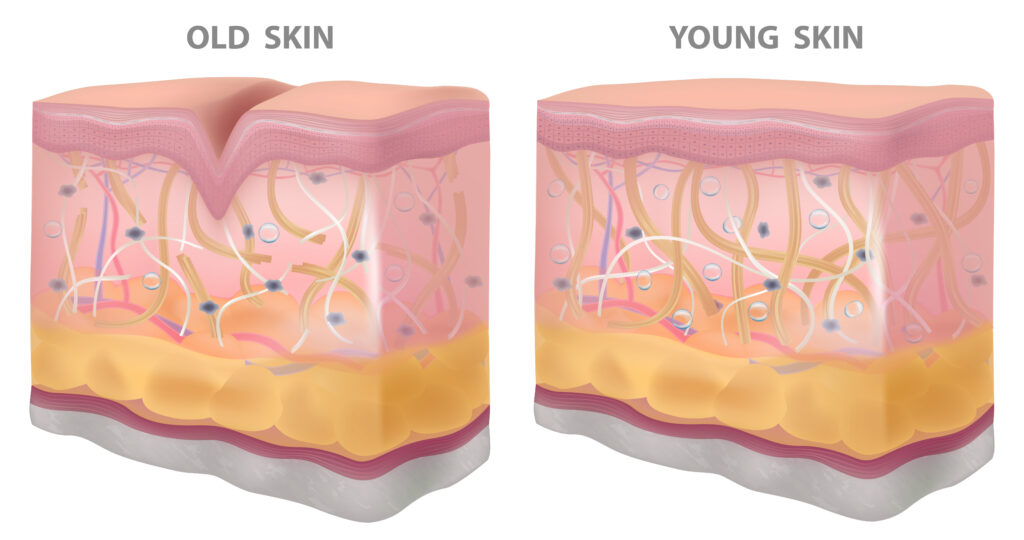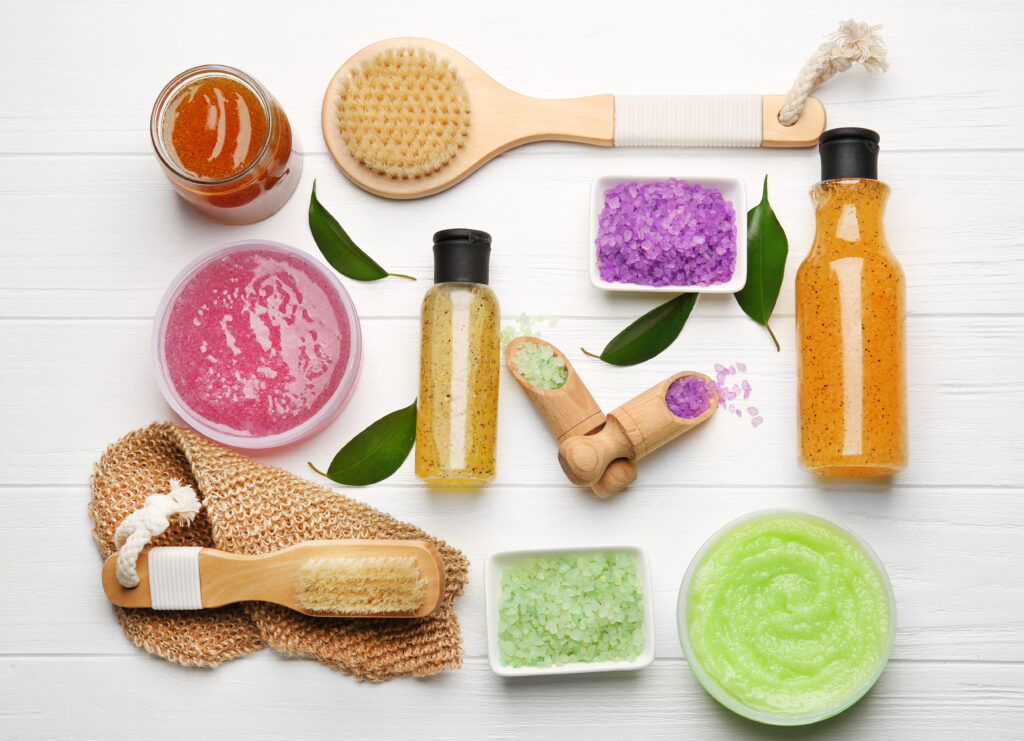
As we age, our skin undergoes various changes that can result in various visual conditions. Some of the most common age-related skin concerns include wrinkles, fine lines, age spots, and loose skin.
These issues can be caused by a combination of factors, including family history, lifestyle choices, and environmental elements.
- The appearance of wrinkles and fine lines are typical indications of the aging process that occur due to the breakdown of collagen and elastin in the skin. As we age, the production of collagen and elastin slows down, causing a reduction in skin elasticity and firmness. This can result in the development of wrinkles and fine lines, especially around the eyes, mouth, and forehead.
- Another skin concern that is commonly associated with aging is age spots, which are also referred to as liver spots or solar lentigines. These are flat, brown or black spots that typically appear on sun-exposed areas of the skin, caused by an overproduction of melanin and exposure to UV radiation.
- Loose skin is another common age-related skin concern that can be caused by a combination of factors. Our skin loses its natural elasticity as we age, leading to sagging and drooping. A loss of facial fat and bone density can also contribute to these issues. Other factors include smoking, a poor diet, and exposure to environmental toxins.
While these concerns may be inevitable to some extent, there are steps that we can take to minimize their impact. This includes maintaining a healthy lifestyle, using skincare products that contain collagen-stimulating ingredients, protecting our skin from the sun, and avoiding environmental stressors.
The Roles of Collagen and Elastin
Collagen and elastin are two crucial proteins that play a significant role in maintaining healthy skin. The skin derives its strength and structure from collagen, which is a fibrous protein. while the skin’s capacity to expand and contract back to its original form is attributed to elastin. Both proteins work together to keep the skin looking youthful, firm, and supple.
The Role of Collagen
Collagen is responsible for maintaining the skin’s structural integrity by providing a framework for the skin cells to attach to. It helps to give the skin its elasticity, firmness, and strength. This protein is produced by fibroblasts, which are specialized cells in the skin.
The aging process causes a slowdown in collagen production, which in turn leads to a reduction in skin elasticity and firmness. Thus, skin wrinkles and loose skin are directly related to aging.
The Role of Elastin

Elastin, on the other hand, is responsible for endowing the skin with its capacity to bounce back and regain its shape. It is a protein that provides the skin with flexibility and resilience. Elastin is also produced by fibroblasts, and its production also decreases as we age. Thus, the decrease in elastin production is equally significant in the development of wrinkles and loose skin.
The reduced synthesis and increased degradation of collagen and elastin as we age can be affected by several factors. Firstly, the natural aging process causes a decline in the production of these proteins. Moreover, the skin’s exposure to environmental factors such as smoking, UV radiation, and pollution can speed up the deterioration of both collagen and elastin.
The Efficacy of Protein Supplementation
Various collagen products are available on the market that claim to improve skin health and reduce the signs of aging. These products can be taken orally or applied topically to the skin.
Oral collagen supplements contain hydrolyzed collagen, which is broken down into smaller peptides that the body can easily absorb. Some studies have shown a correlation between collagen supplements and improved skin hydration, elasticity, and firmness.
Topical collagen products, such as creams and serums, can be placed directly on the skin. The purported benefits of these products include minimizing wrinkles and fine lines while boosting collagen synthesis.
However, the effectiveness of these products is questionable since collagen molecules are too large to penetrate the skin’s surface and reach the deeper layers where collagen production occurs. More research is needed to evaluate their benefits entirely.
Skincare to Combat Age-Related Skin Concerns
Caring for our skin is vital regardless of our age, but as we age, establishing a skincare regimen that targets age-related concerns becomes increasingly critical. Aging skin is more prone to dryness, wrinkles, and age spots, and it requires a different approach to skincare than younger skin.

The following are several holistic skincare interventions to employ to combat age-related skin concerns:
These are essential steps in any skincare routine, becoming even more critical as we age. The natural aging process leads to a thinning and increased fragility of the skin. Hence using harsh or abrasive products may cause harm.
Choosing a gentle cleanser that preserves the skin’s natural oils is vital. Incorporating an exfoliating product in your skincare routine can aid in the elimination of dead skin cells and stimulate cell turnover, improving skin smoothness.
Hydration and Moisturization
These are also vital components of any effective skincare routine for aging skin. Our skin produces less oil as we age, leading to dryness and increased sensitivity. Using a moisturizer that contains hyaluronic acid or ceramides can help hydrate and improve the skin’s health, reducing the appearance of fine lines and wrinkles.
Additionally, incorporating a facial oil or serum can help to lock in moisture and provide an extra boost of hydration.
- Sun Protection
Yet another crucial component of any skincare routine, sun protection becomes even more important as we age. Sun damage is among the primary causes of age spots, wrinkles, and other visible signs of aging. It is crucial to apply a sunscreen with a minimum SPF of 30 every day, even when outdoors on cloudy days.
Wearing protective clothing, such as a hat or long-sleeved shirt, can help further to protect your skin from the sun’s harmful rays.
- Sleep
Finally, adequate sleep is essential for maintaining optimal skin health. Insufficient sleep may cause under-eye dark circles, puffiness, and a lackluster complexion. Conversely, getting at least seven hours of sleep per night can help reduce inflammation and promote cell turnover, resulting in brighter, more youthful-looking skin.
Final Thoughts
Aging is an inevitable part of life, and our skin is no exception. However, with the right skincare routine, it’s possible to minimize the effects of aging and maintain healthy, youthful-looking skin.
